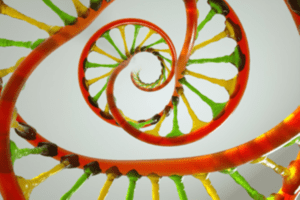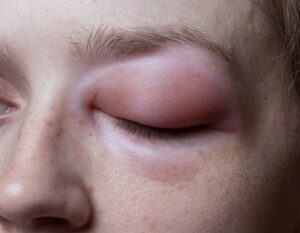Hereditary Angioedema (HAE)
What is hereditary angioedema (HAE)?
“Angio” means pertaining to blood vessels, and “edema” is swelling caused by excess fluid trapped in the body’s tissues. People who have hereditary angioedema (also referred to as HAE or HAE disease) have a genetic defect on chromosome 11 that results in recurring attacks of unexplained, severe swelling (angioedema) underneath the skin. Many things can trigger these attacks, including stress and physical injuries, but the swelling often occurs without a known trigger. Hereditary angioedema affects an estimated 1 in 50,000 people. HAE disease affects men and women, although women seem to be more symptomatic due to hormonal fluctuations.What causes HAE?
In people with HAE, the gene that controls a blood protein, called C1-inhibitor, either doesn’t function well or doesn’t work at all. C1-inhibitor helps the body regulate complex interactions which plays a role in fighting diseases, inflammation, and blood coagulation. When the gene that controls the C1-inhibitor protein is defective, the protein isn’t able to do its job, and excessive amounts of a protein fragment (peptide) called bradykinin are generated. Bradykinin promotes inflammation by increasing the leakage of fluid through the walls of blood vessels into body tissues, causing them to swell.What are the symptoms of HAE?
Swelling caused by hereditary angioedema can occur anywhere in the body, but most commonly develops in the:- Extremities: Arms, legs, hands, and toes may swell to twice or more their normal size
- Face: Lips, eyelids, and cheeks, may swell to such a degree that the person becomes almost unrecognizable; eyes may swell shut
- Intestinal tract: Stomach and intestinal swells may cause the abdomen to enlarge so much that it almost looks like a pregnancy; these swelling attacks can cause severe abdominal pain, nausea, and vomiting
- Throat: Swelling that occurs anywhere near the throat—in the larynx, esophagus, or trachea—is particularly serious because it may make it difficult to impossible for the person to breathe, thus threatening his/her life
How do people inherit HAE?
HAE is inherited in what’s called an autosomal dominant pattern. This means that only one copy of the altered gene in each cell is enough to cause the disorder. So, a child has a 50% chance of inheriting HAE if one parent has the disease. However, sometimes HAE presents itself due to a mutation in the gene of a person who has no family history.What treatments are available for HAE?
If a doctor is unfamiliar with hereditary angioedema, they may treat an attack with something like an antihistamine, only to be surprised when the symptoms do not respond as expected. In fact, hereditary angioedema treatment is highly specialized, dedicated to specifically reducing the symptoms of an HAE attack or lowering their frequency. These hereditary angioedema treatments, depending on the type, may be taken at home or in a clinical setting, and may or may not be approved for children.Where can I find more information about HAE?
Hereditary Angioedema HAE Articles

Deucrictibant Provides Rapid Relief for Hereditary Angioedema Attack Symptoms
Bree Clare
January 7, 2026
Read More »

FDA Approves Ekterly: A New Oral Option for Hereditary Angioedema Attacks
Bree Clare
July 17, 2025
Read More »

The US FDA has Approved Andembry for Prevention of HAE Attacks
Rose Duesterwald
June 27, 2025
Read More »


Investigational Therapy Earns Orphan Drug Designation for Hereditary Angioedema
James Moore
November 15, 2024
Read More »

Experimental Treatment Sebetralstat Shows Promise in Phase 3 HAE Study
Jessica Lynn
February 23, 2024
Read More »

Deucrictibant Reduces Monthly HAE Attacks by 84.5% in Phase 2 Study
Jessica Lynn
January 2, 2024
Read More »

“The Hospital Told Me Not to Come Back Because They Didn’t Know What to do For Me:” An HAE Patient Story
Trudy Horsting
November 17, 2023
Read More »


